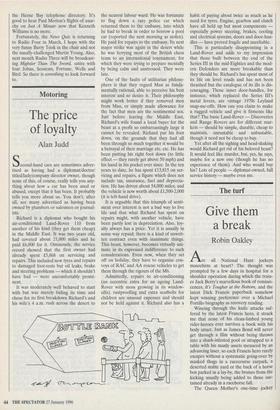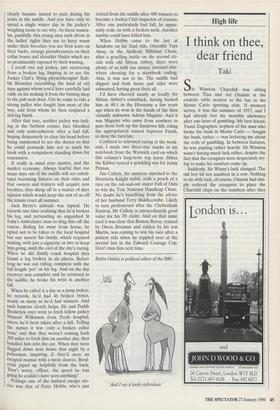The turf
Give them a break
Robin Oakley
Ae all National Hunt jockeys masochists at heart? The thought was prompted by a few days in hospital for a shoulder operation during which the train- er Jack Berry's marvellous book of reminis- cences, It's Tougher at the Bottom, and the latest Dick Francis paperback somehow kept winning preference over a Michael Portillo biography as recovery reading.
Wincing through the knife attacks suf- fered by the latest Francis hero, it struck me that none of his clean-limbed young rider-heroes ever survives a book with his body intact. Just as James Bond will never get through a film without being thrown into a shark-infested pool or strapped to a table with his manly assets menaced by an advancing laser, so each Francis hero rarely escapes without a systematic going-over by masked thugs in a racecourse carpark, a deserted stable yard or the back of a horse box parked in a lay-by, the bruises from the kicking usually being added to those sus- tained already in a racehorse fall.
The Queen Mother's one-time jockey clearly became inured to pain during his years in the saddle. And you have only to spend a single winter day in the jockey's weighing room to see why. As those muscu- lar, painfully thin young men rush about in the ladies' tights they use to keep warm under their breeches you see livid scars on their backs, strange protuberances on their collar bones and shoulder blades which are so prominently exposed by their wasting.
I recall one top jockey, just recovering from a broken leg, limping in to see the Jockey Club's 'flying physiotherapist' Rab- bit Bromiley resembling the kind of old man against whom you'd have carefully laid odds on his making it from the betting shop to the pub next door. Out he came to ride a strong puller who fought him most of the way, and from whom he then conjured a stirring finish.
After that race, another jockey was lurk- ing in the furthest corner, face bloodied and only semi-coherent after a bad fall, hoping desperately to clear his head before being summoned to see the doctor so that he could persuade him not to mark his book with a compulsory standing down for concussion.
It really is mind over matter, and the market economy. Always fearful that too many days out of the saddle will see substi- tutes becoming fixtures on their rides and that owners and trainers will acquire new loyalties, they shrug off in a matter of days injuries which would keep the rest of us off the tennis court all summer.
Jack Berry's attitude was typical. He records one time realising that he'd broken his leg, and persuading an anguished St John's Ambulance man to drag him off the course. Riding far away from home, he opted not to be taken to the local hospital but one nearer his family, which required waiting, with just a cigarette or two to keep him going, until the end of the day's racing. When he did finally reach hospital they found a leg broken in six places. Before long he was out riding, complete with the full length 'pot' on his leg. And on the day recovery was complete and he returned to the saddle, he broke his wrist in another fall.
When he called it a day as a jump jockey, he records, he'd had 46 broken bones, nearly as many as he'd had winners. And such humour clearly helps. He and Paddy Broderick once went to fetch fellow jockey Nimrod Wilkinson from Perth hospital, where he'd been taken after a fall. Telling the nurses it was 'only a broken collar bone' and that they weren't coming back 200 miles to fetch him on another day, they bundled him into the car. When they were flagged down near home that night by a policeman inquiring if they'd seen an escaped maniac with a meat cleaver, Brod- erick piped up helpfully from the back, Don't worry, officer, the speed he was going he couldn't have seen anything!'
Perhaps one of the luckiest escape sto- ries was that of Peter Hobbs, who's just retired from the saddle after 400 winners to become a Jockey Club inspector of courses. After one particularly bad fall, he appar- ently rode on with a broken neck. Another tumble could have killed him.
When Hobbs came to the last at Sandown on his final ride, Greenhil Tare Away, in the Anthony Mildmay Chase, after a gruelling battle on the second cir- cuit with old Sibton Abbey, there were plenty of us with our money invested else- where cheering for a storybook ending. Alas, it was not to be. The saddle had slipped and both horse and rider were exhausted, having given their all.
I'd have cheered nearly as loudly for Sibton Abbey's comeback, having backed him at 40-1 in the Hennessy a few years ago when he won in the hands of the then virtually unknown Adrian Maguire. And it was Maguire who came from nowhere to pass them both up the Sandown hill, riding the appropriately named Superior Finish, to deny the fairytale.
Confined to televised racing at the week- end, I made two three-star marks in my notebook from the Warwick card on which this column's long-term top horse Jibber the Kibber scored a sparkling win for Jenny Pitman.
Jim Culloty, the amateur attached to the Henrietta Knight stable, rode a peach of a race on the out-and-out stayer Full of Oats to win the Tote National Handicap Chase. No doubt he's benefiting from the advice of her husband Terry Biddlecombe. Likely to turn professional after the Cheltenham Festival, Mr Culloty is extraordinarily good value for his 71b claim. And on that same card it was clear that Boston Rover, trained by Owen Brennan and ridden by his son Martin, was coming to win his race after a patient ride when he toppled over at the second last in the Edward Courage Cup. Don't miss him next time.
Robin Oakley is political editor of the BBC.
And I say it looks ridiculous.'



























































 Previous page
Previous page